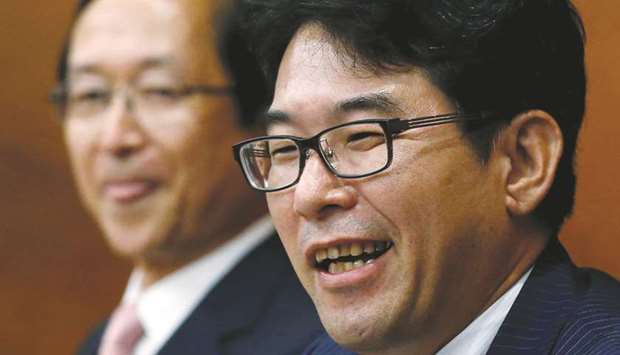Goushi Kataoka, a 44-year-old former economist at Mitsubishi UFJ Research and Consulting and an advocate of massive money printing, said he wants to see the price goal achieved quickly although he cannot say when that can be.
The other new board member, Hitoshi Suzuki, a 63-year-old former deputy president of Bank of Tokyo-Mitsubishi UFJ, who is well-versed with financial markets, said it was “dangerous” to markets to debate an exit from the stimulus now.
“There’s a considerable distance from the 2% target. From my own experience of dealing with markets for 20 years, starting a debate on exit now would be dangerous to markets,” Suzuki told a joint news conference.
He added that the price target was a high goal but he wants to achieve it by any means.
In May, Japan’s Parliament approved the two government nominees for the nine-member BoJ board.
They replaced Takahide Kiuchi and Takehiro Sato, whose five-year terms ended on July 23.
“It was no surprise the two (newcomers) sounded supportive of the current policy given that they were picked by Prime Minister (Shinzo) Abe’s government,” said Naomi Muguruma, senior market economist at Mitsubishi UFJ Morgan Stanley.
“The BoJ board is on course for a unanimous vote for the time being as long as the current policy continues. But the unity will be put to the test when the time comes to shift policy in either direction.”
The departure of Kiuchi and Sato, who both disagreed with most of governor Haruhiko Kuroda’s money-printing steps, means the BoJ may lose a counter-balance to the leader’s radical policies. The appointment of Kataoka could tip the balance more in favour of aggressive stimulus just as the central bank quietly retreats from its monetary experiments.
“Whether to resort to interest rates or quantity in steering policy depends on judgment at the time,” Kataoka said. “I’d like to avoid mistakes while taking into account economic conditions at the time and various policy options.”
Suzuki said the BoJ’s negative interest rate policy has had a significant impact on banks’ earnings, but that is not hurting the financial system or intermediation.
The two men join just after the central bank pushed back the target for hitting its ambitious 2% price goal for the sixth time since Kuroda launched his huge asset-buying programme in 2013.
On July 20, the BoJ maintained its short-term interest rate target of minus 0.1% and its 10-year government bond yield target of around 0%.
The newcomers’ first policy-setting meeting will be on September 20-21.

